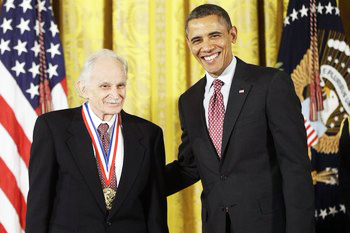Bard is one of 12 eminent researchers who will receive the award at a ceremony in early 2013, announced President Obama on December 21, 2012.
 Chemist Al Bard received his medal from President Obama in the East Room of The White House on February 1, 2013. Photo credit: Ryan K Morris/National Science & Technology Medals Foundation.
Chemist Al Bard received his medal from President Obama in the East Room of The White House on February 1, 2013. Photo credit: Ryan K Morris/National Science & Technology Medals Foundation.
AUSTIN, Texas - Allen Bard, professor of chemistry in the College of Natural Sciences at The University of Texas at Austin, is one of 12 eminent researchers who will receive the National Medal of Science, announced President Obama on December 21, 2012.
The National Medal of Science and the National Medal of Technology and Innovation are the highest honors bestowed by the United States Government upon scientists, engineers, and inventors.
University of Texas Engineer John Goodenough will also receive a National Medal of Science.
Bard and Goodenough will receive their awards at a White House ceremony in early 2013.
“I am proud to honor these inspiring American innovators,” President Obama said. “They represent the ingenuity and imagination that has long made this Nation great—and they remind us of the enormous impact a few good ideas can have when these creative qualities are unleashed in an entrepreneurial environment.”
Bard, the Norman Hackerman-Welch Regents Chair in Chemistry and director of the Center for Electrochemistry, has been called the “father of modern electrochemistry” by his colleagues. His pioneering work in electrochemistry led to the development of the scanning electrochemical microscope (SECM), which is used as an analytical tool in chemistry labs around the world to discover new materials for technologies such as solar cells and batteries, and to investigate the inner workings of biological cells.
Bard and his group were among the first to explore and develop a way to use electrochemistry to generate light, providing a very sensitive and selective method of analysis. Today, this electrogenerated chemiluminescence (ECL) technique is used widely for biological and medical analyses, such as detecting HIV and analyzing DNA.
He and his team were also the first to investigate the electrochemistry of particle semiconductors for solar energy conversion and the decomposition of pollutants using light. And their research on solar cells has led to the development of light-based high-density computer memory.
Bard’s textbook, “Electrochemical Methods – Fundamentals and Applications,” co-authored with Larry Faulkner, president emeritus of The University of Texas at Austin, has been in print for more than three decades and is the fundamental textbook in the field in electrochemistry. The book has taught an entire generation the principles of electrochemistry.
He is a member of the National Academy of Sciences and served as editor-in-chief of the Journal of the American Chemical Society from 1982 to 2001. He has received numerous honors, including the Wolf Prize in Chemistry (2008), the Welch Award in Chemistry (2004), the American Chemical Society Priestley Medal (2002), the National Academy of Sciences Award in Chemical Sciences (1998), the American Chemical Society Analytical Chemistry Award in Electrochemistry (1988), the Luigi Galvani Medal of the Italian Chemical Society (1992), the Electrochemical Society Olin Palladium Medal (1987), the New York Academy of Sciences Award in Mathematics and Physical Sciences (1986), and the Bruno Breyer Memorial Award of the Royal Australian Chemical Institute (1984).
The National Medal of Science was created by statute in 1959 and is administered for the White House by the National Science Foundation. Awarded annually, the medal recognizes individuals who have made outstanding contributions to science and engineering. A committee of presidential appointees selects nominees on the basis of their extraordinary knowledge in and contributions to chemistry, engineering, computing, mathematics, or the biological, behavioral/social and physical sciences.
The College of Natural Sciences faculty includes two other recipients of the National Medal of Science: astrophysicist and Nobel Laureate Steven Weinberg and mathematician Karen Uhlenbeck. Chemistry Professor C. Grant Willson is a recipient of the National Medal of Technology and Innovation. Learn more about the college’s award winning faculty.
For more information contact: Lee Clippard, media relations, 512-232-0675, clippard@austin.utexas.edu

















Comments 1
Congratulations Dr. Bard. So great to see you receive such a prestigious award.